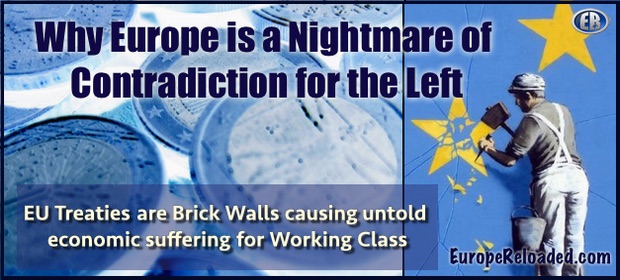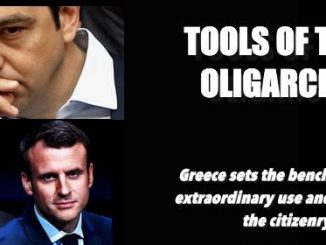
How to save the EU from itself
The EU’s treaties enforce austerity, encourage financial sector control of governments, and cause misery for the working class. But revising them will lead to Germany leaving, and the collapse of the euro.
FREDERIC LORDON
All these measures are essential for social justice, yet are prohibited under EU treaties.
.
Some will say let’s revise the treaties. After the idea of a ‘social Europe’, the ‘democratic euro’ is the latest illusory solution that allows the ‘unthinking left’ to delay the moment when it has to face the European problem. Yanis Varoufakis (pictured – see Let’s change Europe from the ground up, in this issue),  former French economy minister Benoît Hamon, and journalist Raphaël Glucksmann all want to revise the treaties. Let’s be clear: that’s not going to happen.
former French economy minister Benoît Hamon, and journalist Raphaël Glucksmann all want to revise the treaties. Let’s be clear: that’s not going to happen.
The EU treaties are only a mistake if you believe that a political community would be mad to rule out the possibility of changing its mind on currency, budgets, debt or the movement of capital, of voluntarily abandoning those policies that weigh heaviest on the material circumstances of its peoples. The few people who regard those treaties as adequate have as their barely concealed objective the protection of an economic policy that favours certain interests. The treaties are untouchable because of the neurotic commitment of Germany, which has told itself for over 50 years that monetary and budgetary orthodoxy is its only defence against Nazism.
Germany against reform
The European deadlock is the result of a system that removes much of the most important public policy from debate by an ordinary assembly, enshrining it in treaties that can only be revised by extraordinary procedures, and so has disqualified itself from being considered as democratic.
Only a revision of the treaties that establishes a true parliament, with decision-making powers in all the areas currently beyond the reach of any new sovereign deliberation, could possibly make the EU democratic. As things stand, such a revision would be subject to categorical rejection by at least one member-state: Germany, which has made its participation in the euro conditional on the enshrinement of its orthodoxy in EU treaties. Were Germany to be outvoted on this point, it would prioritise maintaining the integrity of its principles over membership of the EU.
This is the democratic European left’s dilemma: the true democratisation of the euro means revising the treaties — but revising them will lead to Germany leaving, and the collapse of the euro. Of course, if that reality is too harsh, one can take refuge in fantasy, hence the dream of a ‘democratic euro’.
The problem is no less acute for those who can see the contradiction and prefer progressive policies to euro-fetishism. Economist Stefano Palombarini believes an exit from the euro is impossible within the framework of the leftwing electoral bloc as it is currently constituted: some factions cry nationalism if the idea is even mentioned. In one sense, Palombarini is right. Since 2010 the debate on the euro has shown how deeply the left is divided. The instinctive revulsion is evident in the persistent chimera of an alternative euro — a fantasy that even the Greek disaster wasn’t enough to dispel, and which persists in the obstinate and misguided quest for a ‘parliament of the euro’.
Many on the left disapprove, sometimes vehemently, of the specific content of EU policies and the constraints these impose on the pursuit of national policies. But they still resist the general idea of leaving the euro. They repeatedly declare their opposition to austerity Europe, but reject any suggestion that they should leave it.
The left will not get into power while this impasse continues.
The left will always have to contend with the educated class, who are at the centre of this problem, believing themselves to lead rational thought in society, while in fact being the embodiment of incoherence. They, more than anyone, are victims of fear, sublimated into European humanism and abstract internationalist posturing; they believe these entitle them to occupy the moral high ground, whatever the economic and social cost to others. And so they continue to seek an illusory solution to their private contradictions in a democratic euro and a parliament of the euro. Unfortunately, as Palombarini notes, the left’s political strategy has to contend with these people.
An exit from the euro
How can the left build an alliance of the working class, who experience the impact of EU policies first hand and have fewer Europeanist scruples, with the educated leftwing bourgeoisie, whose delicate sensibilities mean that any suggestion of leaving the EU is likely to cause outrage? The working class will undoubtedly have to be given an exit from the euro; the leftwing bourgeoisie will need special treatment, and have to be offered something else.
What can genuine internationalism do to resolve the left’s dilemma, to avoid depriving the educated class of their Europe, and offer them an alternative European perspective? They need to be persuaded that letting go of their transitional goal, the euro, will not mean giving up everything, and that they can continue to believe in what they are, in a sense, right to believe in. Which is the importance of persuading the peoples of Europe to look beyond their nationalisms and of bringing them as close together as possible, starting at the European level. But not by any means, not at any cost, and not by thoughtlessly transforming this well-justified internationalist desire into the worst aspects of neoliberal economics — internationalism applied to currency, trade and finance.
So the left, without abandoning efforts to convince the educated class that there can be no ‘other’ euro and a democratic euro is impossible, must tell that class — who to a great extent will determine whether the left can get into power — that they do not have to give up their beloved generic Europeanism. And the left will have to offer them something big enough to replace the broken promise of the euro, which the leftwing bourgeoisie cling to because they are scared of a vacuum. The left must promise them a new European project that is substantial enough to realise their dreams.
It is possible to bring the peoples of Europe closer together by other means than economics: higher and even secondary education, the arts, research, open workshops on language translation, and denationalised historiography are all candidates for intensive Europeanisation. All can help to Europeanise us.
But Europeanisation need not be limited to initiatives for the building of a cultural Europe. (It is clear which social classes most benefit from this.) The EU has much to do to make up for its past treatment of the working class, and should remember this, not for the sake of forgiveness or redemption, but because it is in the EU’s political interest to have the working class on board. Their (perfectly justified) hostility has been an open sore for the EU since the Maastricht treaty.
The EU must not stint on resources
So if this new Europe, freed from the burden of the euro, wants to rebuild its relationship with the working class, it needs to talk to them directly in a language they will understand: that of financial help. The easiest way for the EU to make itself more appealing is to step in on behalf of failing states (whose failure has been caused by the single currency) with major programmes of suburban regeneration, plans for ending digital isolation, reindustrialisation funds, finance for popular education networks, support for citizens’ associations. The EU has plenty of scope for refurbishing its brand image.
The EU must not stint on resources. The scale of the resources it allocates will differentiate between empty promises and solid political initiatives. The adequacy of the resources can be evaluated by measuring them against a quantitative global objective, and they will require a medium-term budget target of 3%, and later 5%, of the EU’s GDP, rather than the current ridiculous 1%.
Some of these initiatives already exist, such as the Erasmus programme and the European Regional Development Fund. But their scope must be extended, as must their targets, to include beneficiaries until now totally neglected. They must be implemented on an unprecedented scale and linked by a doctrine with a historical vision. To make this more credible, they must have visible new institutional expression. There must be a body that decides on the scope, scale and distribution of initiatives, and that body has to be an assembly quite different from the impossible parliament of the euro (a subterfuge intended to conceal the irremediable non-democracy of the monetary union).
It might be hoped that even the educated bourgeoisie, who are often politically blind, will understand that the EU urgently needs saving from itself, and that this can only be accomplished through a radical shift — not by transforming the single currency, which is ordoliberal and will be for a long time to come, but by abandoning it.
The EU will only regain the favour of its peoples by giving them back everything it has denied them, notably the democratic right to experiment. Once we have shed the straightjacket of the euro, anything will be possible again, within the scope of the sovereign self-determination of each body politic. And since we are considering a strategy for the left, this could mean taming the financial markets, socialising the banks, curbing the powers of shareholders, and the public ownership of means of production.
It should be possible to explain to the most anxious that, while continuing with the euro would be the death of all hope for the left, the idea of a European political community does not have to be abandoned. Provided we are willing to create the necessary conditions, it might be possible to save it as the crowning achievement of a long rapprochement, which this time will truly bring the peoples of Europe ever closer. The new European project, purged of the neoliberalism that poisons the EU today, will finally provide means and opportunity.
************
Original article

••••
The Liberty Beacon Project is now expanding at a near exponential rate, and for this we are grateful and excited! But we must also be practical. For 7 years we have not asked for any donations, and have built this project with our own funds as we grew. We are now experiencing ever increasing growing pains due to the large number of websites and projects we represent. So we have just installed donation buttons on our websites and ask that you consider this when you visit them. Nothing is too small. We thank you for all your support and your considerations … (TLB)
••••
Comment Policy: As a privately owned web site, we reserve the right to remove comments that contain spam, advertising, vulgarity, threats of violence, racism, or personal/abusive attacks on other users. This also applies to trolling, the use of more than one alias, or just intentional mischief. Enforcement of this policy is at the discretion of this websites administrators. Repeat offenders may be blocked or permanently banned without prior warning.
••••
Disclaimer: TLB websites contain copyrighted material the use of which has not always been specifically authorized by the copyright owner. We are making such material available to our readers under the provisions of “fair use” in an effort to advance a better understanding of political, health, economic and social issues. The material on this site is distributed without profit to those who have expressed a prior interest in receiving it for research and educational purposes. If you wish to use copyrighted material for purposes other than “fair use” you must request permission from the copyright owner.
••••
Disclaimer: The information and opinions shared are for informational purposes only including, but not limited to, text, graphics, images and other material are not intended as medical advice or instruction. Nothing mentioned is intended to be a substitute for professional medical advice, diagnosis or treatment.





